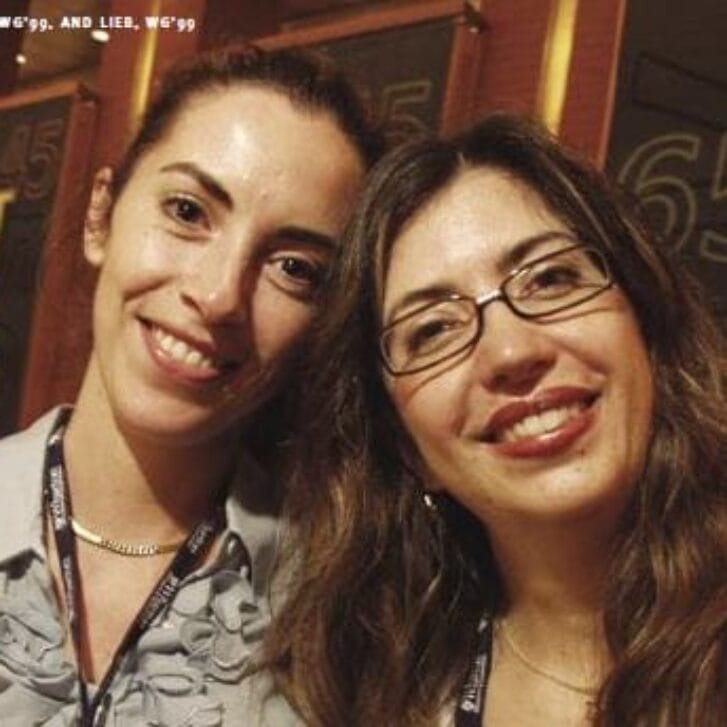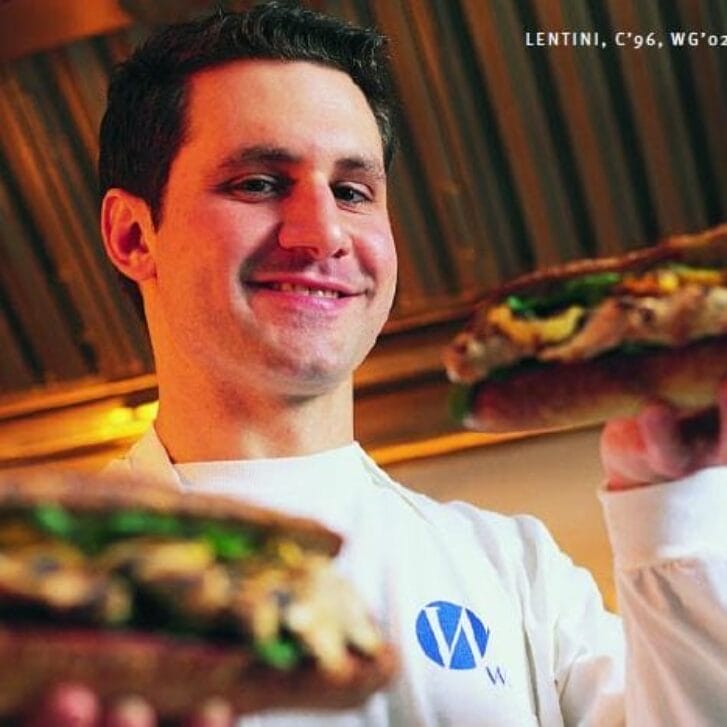David Feldman, W’82, L’85, and chairman of the Wharton Alumni Association Board, swears this is a true story: A Wharton student walked up to an acquaintance who is an administrator at the School one day and said: “You know, everyone here talks about getting a job as an investment banker, but I don’t really know what one is.”
“And these are smart kids, really smart kids,” says Feldman, managing partner of the New York-based law firm Feldman Weinstein, LLP. But academic life, he says—even at the highest level of the game—doesn’t often include teaching detailed job descriptions. If a student wants to know what it’s like to work in the tax department of a Fortune 500 company, or how a stock broker starts his day, or how to organize the press launch of a new advertising campaign, their best bet is likely to ask someone outside the classroom.

Byun, W’05
That doesn’t necessarily mean looking outside the Wharton community, however. The School is actively seeking alumni willing to donate a small amount of their time to mentor students, something the students say has proved invaluable. Take Edward Byun, for example, a Wharton undergraduate in his senior year who is studying for a dual degree with the College of Arts and Sciences. Byun enrolled last spring in an entrepreneurial management class that called for developing a business plan from scratch. It also offered the chance to work with a mentor matched with the group through Wharton Entrepreneurial Programs (WEP).
Clare Leinweber, associate director of WEP, says the staff forwards mentor applications to professors for distribution to students. Interested students send their completed applications directly to Clare’s office, including details about their proposed business ventures. The WEP staff then searches a database for mentor candidates with related industry experience, and Clare sends out inquiries to potential mentors to gauge their interest and availability. Mentors and students are then connected via email.
Byun’s group came up with the idea of starting an on-campus and on-line apparel company catering to the needs of student groups like fraternities, sororities and clubs. Although other businesses sell tee-shirts, sweatshirts and the like imprinted with student group logos and mottos, Byun and his student colleagues conducted a study suggesting that student-centered service was missing from the marketplace. Student groups, for example, wanted the convenience of on-line shopping and the opportunity to have sample items custom made before buying in bulk.
The business plan for Byun’s group project described the product and included an analysis of market need, how to fulfill it, and how to differentiate the business from competitors. The young entrepreneurs brought in friends and interviewed them, then designed an advertising plan. The final piece of the project addressed financing: how much the business would cost to start, how much cash flow would be needed at various points, etc.
Although the idea seemed potentially viable, the young entrepreneurs knew they faced a big obstacle: financial margins in the apparel industry are continuing a downhill slide. Enter Seth Berger, WG’93, founder and CEO of AND 1, a $200 million-a-year company that makes basketball shoes and other apparel worn both by fans of the game, playground stars and some of the NBA’s big-name players.
After a series of introductory e-mails, Byun and one of his fellow group members visited Berger at AND 1 headquarters, which Byun calls “an incredible place.”
“You can immediately tell it’s a cool place to work. Everybody was very approachable, very friendly. They have a basketball court in the office,” he says in awe. “It’s just a dream workplace for somebody who loves basketball, like me.” And like Berger: the name ‘AND 1’ refers to a popular basketball expression uttered when a player is fouled while making a shot.
The students ended up talking with Berger for an hour and a half, not just about their project, but also about their professional goals, their school experiences and life.
“It really is a great program that gives students like us the opportunity to meet somebody like Seth,” Byun says.
For his part, Berger says he believes pursuing entrepreneurship is the best decision a Wharton grad can make, assuming they can afford to overlook the short-term opportunity cost. “Over five to 10 years, most Wharton grads will get more satisfaction and financial rewards from starting their own business than from taking a job,” he says. “Any time I can help sway a student in this direction, I always take the opportunity.”
He does so at least once a year, making time to return to campus, speak to classes and take students to lunch. He credits a Wharton entrepreneurship class with inspiring him to found his own company back in the early 1990s. For the class, Berger authored a feasibility study on starting a sportswear retail outlet. He concluded overhead was too high and competition too fierce, but hung on to the kernel of the idea thanks to his professor’s urging.
On the eve of a third-round interview with an investment bank, Berger says he was sitting in a bar in New York City, listening to his best friend’s advice: Take a chance. You’re already broke.
“He said, you don’t want to be in a job in two years, asking yourself, ‘What if I had started AND 1?’ I woke up the next day, called the bank, canceled the interview and decided to start.”
Byun is at that pivotal juncture now, on the eve of recruiting season. And although he’s not planning to follow in Berger’s entrepreneurial footsteps just yet, their conversations did embolden the soon-to-be graduate to take a chance of his own. He will likely start work next year for Goldman Sachs in Hong Kong, rather than in a culturally less challenging U.S. location.
He also says he will keep Berger’s story in mind and wouldn’t hesitate to call him if he ever finds himself at a professional crossroads. Especially if that crossroads involves an entrepreneurial venture.
“Our experience with Seth was really a very overwhelmingly positive one,” says Byun. “In the truest sense of the word, he really did serve as a mentor to us.”
Welcome to your New Network
Beth Hagovsky, senior associate director of the Wharton Undergraduate Division, says contact with alumni helps embed students in the Wharton community right from the beginning of their campus lives.
“It’s especially important in introducing students to the breadth of career options a Wharton degree opens,” she says.
Hagovsky cites these as the main reasons Wharton administrators have strongly backed a student-inspired program to introduce alumni to incoming freshmen even before classes begin.
For the past two years, student leaders of the Wharton Undergraduate Alumni Relations Council (WUARC) have teamed up with Alumni Association Board chairman Feldman and the Undergraduate Division staff to arrange for alumni to make hour- long presentations to incoming freshmen. The one-day event, held the day before classes begin, focuses on topics not likely to be found on the standard class syllabus.
Collectively known as the Wharton Colloquia, this fall’s dozen seminars included such topics as “Getting Rich: Lessons from America’s Wealthiest Families”; “Becoming a CEO before you’re 40”; “Why Most Career Choices Change-and Why it’s OK”; and “Is it Still a Man’s World? Being a Young Woman in Business Today.” (See Share Your Success: Wharton Colloquia for a sample of this year’s Colloquia topics and alumni presenters.)
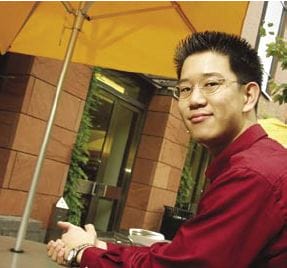
Choi, W’05
The sessions, so far open only to freshmen, attracted some 350 students, up from 273 in 2003, according to Joshua Choi, W’05, chair of WUARC.
Choi, whose group also orchestrates regular brown-bag lunches for small groups of students to meet alumni, says WUARC’s goal for the Colloquia was to create an institutional tradition connecting incoming freshmen to the vast pool of Wharton alumni. “The importance of a business education doesn’t necessarily come just from the classroom,” he says. “It definitely comes from people, from networking.”
Feldman’s presentation during this year’s Colloquia was titled “Effective Business Networking.” He covered the appropriate times to ask for a person’s business card (always at a business function, less so at social or charitable events); what to do with it once you’ve got it (follow up with an invitation to meet); the particulars of networking with people of different professions; and how to keep up contacts that could be useful in the future.
That included advice on when to do business with a contact you meet, and when not to do so. In the latter category, Feldman told the story of a close friend he went to school with, but has never pursued for business. He describes the guy as someone who kept a disorganized apartment, missed deadlines, and partied a little too much. Those impressions stuck with Feldman and made him nervous about ever getting professionally entangled. He reminded his student audience that networking starts now, and that they should be careful how they present themselves on campus. It’s not that you can’t wear sweats to class, he says but don’t ever look too sloppy. What if you run into the dean?
“I have a lot of connections with people I met at school that have turned into opportunities,” Feldman says. “The truth is, if you want to move from mid-level success to high-level success, you almost certainly will not be able to do it without networking.”
Another wildly popular colloquium was given by Vige Barrie, CW’74, WG’76, who covered presentation skills and dressing for success.
Barrie, who is director of media relations for Hamilton College, began her presentation wearing a ‘crunchy-granola’ folk singer skirt, a long vest and stocking feet shod with open-toed shoes. About half way through her talk—just as she was mentioning the merit of wearing clothes you feel comfortable in—Barrie said: “I’m sure you must have noticed this is not my ideal outfit.” After saying that, she pulled down her elastic-banded skirt and peeled off the vest to reveal a suit skirt and black top, to which she quickly added a smart-looking jacket and decent shoes.
The transformation really demonstrated that a picture is worth a thousand words.
“It also brings you closer to the audience. They are laughing at you and you are laughing at yourself,” Barrie says. The quick- change also re-enforces her point that good visuals improve the quality of just about any presentation.
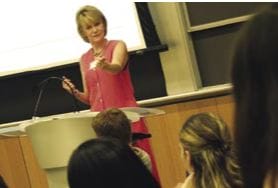
Barrie, WG’76 (Before)
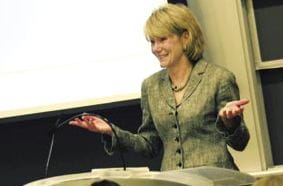
Barrie (After)
Hagovsky says sessions like Barrie’s were such a success that many ran overtime because the audience swamped alumni with questions. “Certainly the buzz as the day went on was that more and more kids were trying to get in because they heard how great it was,” Hagovsky recalls. “These are topics that every business school should be telling the kids about . . . . We love it. Everything about it is great for the School.”
So great, she says, Wharton plans to launch a similar program this spring open to sophomores, juniors and seniors.
Choi is also working on another mentoring event to cement at least one alumni contact for graduating seniors like himself.
Called the Senior Send-Off, the idea is to group seniors together based on post-graduation geography: all those headed for Boston in one group, New York in another, etc. Then Choi wants to find at least one Wharton alum from each major metropolitan area to come to campus in the spring and introduce themselves to their soon-to-be neighbors.
Hagovsky has some concerns about capturing seniors’ attention as their final semester wears on, but says the school is continually looking for ways to involve students with alumni. Another possibility is for local alumni clubs to host receptions for seniors during winter break. “That to me would be ideal. You kind of welcome them into the Wharton club before they even graduate,” Hagovsky says.
“Grizzled Veterans” and Fledgling Ventures
Whereas the Colloquia are a brief and fun introduction to a handful of Wharton alumni, the school’s annual Business Plan Competition takes mentoring to a whole other level. Contacts that participants make with alumni via the year-long competition can infuse fledgling entrepreneurial ventures with the very lifeblood they need to get off the ground: money, and direct links to industry leaders and venture capitalists.
The competition—which attracted some 200 student teams last year—is managed by Wharton Entrepreneurial Programs and is open to any Penn student. Past final-round judges have included representatives of St. Paul Venture Capital, Canaan Partners, JK & B Capital, Johnson & Johnson, Sienna Ventures and Microsoft. Some 300 volunteers served last year as judges for earlier stages of the competition and as mentors.

Jarrett, W’05 (Right) with Josh Gilper, ENG’03
Eliot Jarrett, a Wharton senior whose team won the undergraduate award for their plan to launch a computer animation company, was paired with mentor Paul Hynek, CEO of Santa Monica, California-based Spitfire Ventures. Hynek not only made himself available to Jarrett, but introduced his student protégé to his brother Joel Hynek, whose work on the 1998 film What Dreams May Come garnered an Oscar for visual effects.
Jarrett says he has never taken a class that covers how to develop a business plan, but has participated in the Business Plan Competition since his freshman year. He decided to tackle the process of rendering in animation because: “I had read about how intensive the process is, and it struck me as absurd that it took so long.”
Hynek, WG’90, G’90, says the idea of mentoring a business competition student appealed to him because he believes entrepreneurship fits well with “the grizzled old veteran lending his input.”
“I’ve looked at so many business plans, it’s easy in my mind to distill the key parts of a business and see the pitfalls,” he says. He credits Jarrett with asking very high-level questions during their telephone calls and e-mail exchanges—no surprise, considering that Jarrett began developing his concept freshman year and had previously ushered it to the Business Plan Competition semifinals.
Hynek told Jarrett most venture capitalists care about one thing: return on their investment. Next they look a candidate in the eye and size up whether they think he or she can deliver what’s promised. Then and only then do they ask, “Okay, what are you making?”
He says the biggest concern he had about Jarrett’s venture was the likelihood that a major entertainment company like Pixar would be willing to give something as valuable as a feature-length animated film to an outside company and entrust that company with adding shading, lighting, etc. to the rough sketches Pixar would supply. The process is called rendering, and Jarrett’s proposed company, Distributed Resource Imagery, proposes to do it faster and more efficiently.
In the end, Hynek says he was convinced that Jarrett not only had a better mousetrap to sell, so to speak, but that Hollywood’s oh-so-insular world might be convinced to buy it because the process of rendering is really peripheral to film making itself. Why not outsource a task that isn’t your core strength anyway?
Once Hynek delivered his own expertise on product development and marketing, which is what Spitfire does for its clients, he turned Jarrett over to his brother. Joel Hynek, in turn, offered some inside-the-industry tips and a letter backing Jarrett’s idea.
Paul says introducing Jarrett to Joel seemed natural… “I signed up to give Eliot the best help I could . . . . Joel and I swap ideas back and forth a lot so it seemed like I could give Eliot the business stuff and Joel could give him the technical stuff,” he says.
Not that Paul was completely out of the entertainment loop. He was paired with Jarrett partly because of his experience launching a film production company and serving as president of a company specializing in “motion capture,” a technology that uses computers to document a person or animal’s movements so the patterns can be used by another entity on screen.
He describes his interaction with Jarrett as smooth and professional.
“It was a nice experience for me because the signal to noise ratio was very high—I was very impressed. Us Wharton MBAs, we’re very laid back. The undergrads, man, they’re sharks.”
Jarrett called his mentor “a fantastic match” because Hynek had knowledge that was specific to the film industry and remained available even after the year ended.
“Paul was only assigned to me for sophomore year,” Jarrett says, “but he continued to answer my e-mails. It was good to continue the relationship.”
Freelance writer Sharon Crenson’s cover story on alumni who work in the media (“Making News”) appeared in our Winter 2004 issue.
Knowledge in 30 Minutes: The Entrepreneur-in-Residence Program
For those students feeling the entrepreneurial urge, the chance to sit down and have a one-on-one conversation with the founders of such companies as J.D. Power & Associates, And1, and Texas Monthly is a dream. Now in its fourth year, the Entrepreneur in Residence (EIR) program offers all Penn students this rare opportunity by bringing a different highly accomplished entrepreneur to campus every Tuesday during the academic year. Developed by Wharton Entrepreneurial Programs, the EIR allows students to meet with the entrepreneurs for 30-minute sessions to discuss ideas, opinions, and strategies for potential or actual business ventures. Registration opens two weeks before the EIR arrives on campus, and students must sign up in advance via the EIR program website.
For the Fall semester, the EIR program has announced a new slate of company founders:
Jason Olim
Founder & CEO, CDNOW
Angelique X. Irvin, WG’00
President, Clear Align
Ron Murayama, WG’03
Chairman & CEO,
Amden Corporation
Marty Grims
Founder, Moshulu Restaurant
Betsy Ludlow, WG’82
Founder, Slim and Tone
Seth Berger, W’89, WG’93
Founder & CEO, AND1
David Power, WG’59
Chairman of the Board,
JD Power & Associates
David V. Johnson
Chairman, Victor International
Mike Levy, W’68
Founder & Publisher,
Texas Monthly
The EIR program welcomes successful entrepreneurs who enjoy working with students aspiring to follow in their footsteps. (For information on how to become involved, see Mentoring 101 below.)
Share Your Success: Wharton Colloquia
How do some people become CEOs early in life? When is it appropriate to ask for a business card? Is business still a man’s world? Wharton undergrads recently got some answers to these and other questions not typically covered in the classroom at the second annual Wharton Colloquia held by the Wharton Undergraduate Alumni Relations Council (WUARC). The series of seminars designed for incoming freshmen and taught by Wharton alumni included:
Effective Business Networking: David Feldman, W’82, L’85 (Managing Partner, Feldman Weinstein, LLP) discussed the art of networking and how to maintain relationships that will help an individual in future career positions or internships.
Presentation Skills, Dress for Success, Etiquette and More: Vige Barrie, CW’74, WG’76 (Director of Media Relations, Hamilton College) explored the ways students can leave a lasting impression on professors and colleagues and prepare for climbing the corporate ladder.
Defining Successful Leaders: James Anchin, W’65, WG’66 (Managing Partner, Anchin Block & Anchin, LLP) led a discussion of what it means to be a successful leader in college, the meaning of leadership in the workplace, and the myths about leadership.
Stock Markets 101: Matthew Greene, WG’ 89 (Managing Director, Utendahl Capital Partners, LP) described how he has successfully worked the stock market and offered some steps for success.
Are you an Entrepreneur?: Nigel Edelshain, WG’ 93 (President, Ivy Technology Partners) discussed some common characteristics of entrepreneurs and described his own experiences starting a business.
Becoming a CEO Before You’re 40: Anne Kalin, WG’91 (General Manager, Lynka Promotional Products) described her own experiences to illustrate how one can become a CEO early in life and how students can better prepare themselves for a corporate leadership role.
Is it Still a Man’s World? Being a Young Woman in Business Today: Ellen Desmaris, WG’02 (Management Development Program, McGraw-Hill Education) explored the “glass ceiling” in business today and described how she has successfully overcome obstacles in building her own career.
Why Most Career Choices Change—and Why It’s OK: Lorrie King, WG’91 (Director-Marketing, Boots Retail USA, Inc.) used her background to explore the positive and negative effects of career changes.
Venture Capital 101: Dr. Teo Dagi MD, WG’ 85 (Managing Partner and Managing Director, Cordova Ventures) outlined the key steps in pursuing capital for a new venture.
Managing Your Career Like a Brand: Chris Malone, WG’91 (Senior Vice President, Aramark) explained how to tackle career choices, resumes, and personal presentation to manage them like a commercial brand.
For information on how to become involved in future Colloquia, see Mentoring 101 below.
Mentoring 101: How to Get Involved
1. Join the Alumni/Student Network.
More than 3,900 alumni have signed up for Wharton’s online matching service for alumni who are willing to talk with students who have similar career interests. To participate, visit www.wharton.upenn.edu/alumni and select “Alumni/Student Network” from the menu on the left. Follow the directions for updating your online directory listing to indicate your willingness to connect with current Wharton students.
2. Participate in future Undergraduate Colloquia (or similar events).
Events like the Colloquia provide students with their first introduction to the Wharton Network. To become involved, email Beth Hagovsky, senior associate director of Wharton’s Undergraduate Division, at hagovsb@wharton.upenn.edu. Also, the Wharton Undergraduate Alumni Relations Council (WUARC) offers a brown bag luncheon series featuring alumni guest speakers. To express interest, contact WUARC via email at wuarc-04-05@wharton.upenn.edu or Justin Lo at justinlo@wharton.upenn.edu.
3. Apply to become an Entrepreneur-in-Residence.
Student spaces in this program fill quickly, as individual feedback from an established entrepreneur is a rare opportunity. Entrepreneurs who are willing to share their expertise are asked to:
- Provide an up-to-date biography, a photograph and a description of three areas of expertise offered
- Be in residence at Wharton for at least one day
- Meet with students in 30-minute intervals that day
- Protect the confidentiality of any proprietary business information the students may share.
If you are interested in participating, contact the EIR program by email at entrepres@wharton.upenn.edu. An application form can be found on the WEP website: .
4. Consider mentoring a Business Plan Competition team.
Mentors for the Wharton Business Plan Competition play an important part in guiding University of Pennsylvania student teams, and they also can benefit by gaining exposure to other mentors, judges and entrepreneurs. Mentors are also eligible to become early phase judges in subsequent Competitions.
For information on the requirements for mentoring a team, visit www.wep.wharton.upenn.edu/bpcmentoring.html or email wep@wharton.upenn.edu.























